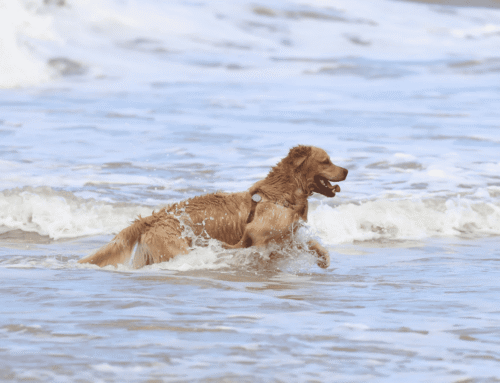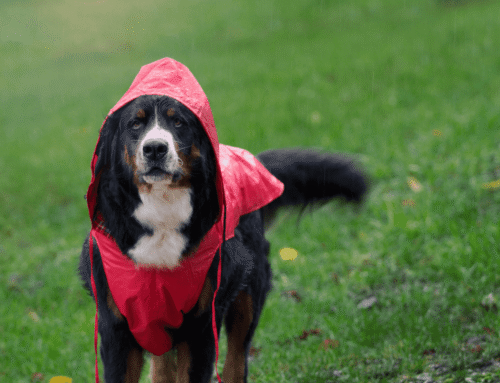Many pet owners we speak with are concerned about whether the recent coronavirus outbreak can affect their pets. We seem to be hearing about coronavirus at every turn, so we are not surprised that people are asking questions about their pets’ safety. We know that safety is your top priority for your family members—two- and four-legged—so we are answering your most common questions about coronavirus infections and pets.
#1: What is coronavirus?
Coronaviruses are a family of viruses, many of which infect people and different animal species. Coronaviruses are typically species-specific, meaning they affect only people or one specific animal species. Occasionally, a virus can mutate and jump from one species to another, particularly when newly emerging, which is why many human infections originate in animal species. The coronavirus causing the recent human outbreak, COVID-19, likely originated in bats, and developed the ability to infect humans through a genetic mutation.
#2: Can coronavirus affect my dog?
Many species-specific coronavirus strains cause different diseases in animals. Dogs can become infected with two coronavirus strains:
- Canine enteric coronavirus (CECoV) — The enteric form of coronavirus infection causes mild, self-limiting enteritis that mainly affects dogs younger than 12 weeks of age. The virus is passed in infected dogs’ feces, and transmitted to other dogs who accidentally ingest the virus from their environment. CECoV is a common cause of diarrhea, lethargy, and decreased appetite in puppies, but signs are generally short-lived, and clear up on their own. Occasionally, more severe enteritis develops, particularly in puppies with other illnesses, such as intestinal parasites or parvovirus, and warrants veterinary treatment from your veterinarian. Severely affected puppies may require intensive treatment for recovery. A coronavirus vaccine is included in most canine vaccination schedules, and is an important component of protecting your dog from infectious disease.
- Canine respiratory coronavirus (CRCoV) — The canine respiratory coronavirus strain causes mild upper respiratory infection in dogs. Coronavirus is one of the pathogens that contributes to canine kennel cough complex, which is often caused by more than one pathogen, including Bordetella bronchiseptica, parainfluenza virus, and adenovirus. Infection is most common in dogs who have contact with other dogs, such as those who frequent boarding facilities, doggy daycares, or dog parks. Infection typically causes mild clinical signs, such as nasal discharge, coughing, and sneezing, that resolve without treatment, but can cause more severe illness, such as pneumonia, especially if co-infection with another respiratory pathogen is present.
#3: Can coronavirus affect my cat?
Feline enteric coronavirus (FECoV) is a common cause of mild diarrhea in kittens, and many cats are exposed to the virus at a young age. Similar to the canine enteric form, the virus is passed through fecal-oral transmission, and typically causes mild disease that resolves without treatment.
Feline infectious peritonitis (FIP), which is a more serious coronavirus infection that can affect cats, is caused by a mutated FECoV form that can be passed through the feces of infected cats. Cats who become infected can develop two disease forms.
- Effusive FIP — This infection, also called wet FIP, causes abnormal fluid accumulations in the abdomen and thorax that cause abdominal distension and breathing difficulty.
- Granulomatous FIP — Also known as dry, or non-effusive, FIP, this form causes cellular infiltrates on various organ surfaces, most commonly affecting the eyes and nervous system.
Unfortunately, FIP is a progressive, fatal condition, and affected cats typically do not live long after diagnosis. Frustratingly, an effective FIP vaccine is not available, and preventing contact with unknown cats is the best way to protect your furry feline.
#4: Can COVID-19 infect my dog or cat?
Although dogs and cats can contract the coronavirus infections described above, no evidence suggests they can contract, or become ill from, COVID-19, despite reports that a dog in China, who belonged to a person infected with COVID-19, tested weakly positive for the infection. This dog likely picked up virus particles from the owner, but did not actually become infected or sick from the virus. According to the Centers for Disease Control and Prevention (CDC), no pets have been reported to have contracted COVID-19.
#5: Can my pet transmit a coronavirus infection to my family members?
The coronavirus strains that infect dogs and cats cannot be transmitted to people, and are unlikely to mutate to a form that can jump to humans. Viruses are most likely to mutate when they are new and unstable, and the canine and feline coronavirus strains have been around for decades without infecting humans, meaning they are stable and unlikely to mutate. According to the CDC, no evidence currently exists that COVID-19 can be spread by companion animals, including dogs and cats.
Keep in mind that the coronavirus can live on surfaces for a short period of time, and if a person infected with the virus pets your pup, she could carry the virus on her fur. If coronavirus infection spreads to our area, you should prevent contact with people who may be sick. Follow the CDC’s tips for preventing infection, which include:
- Washing your hands with soap and water for at least 20 seconds, especially after using the bathroom, before eating, and after coughing, sneezing, or blowing your nose
- Using hand sanitizer that contains at least 60% alcohol
- Cleaning frequently touched objects, such as cell phones, purses, and computers, with disinfectant spray or wipes
- Avoiding contact with sick people
- Avoiding touching your face
- Staying home if you are sick, to avoid exposing others
- Covering your cough or sneeze with a tissue, then discarding the tissue in the trash
If you have concerns about coronavirus and your pet, or if you think your pet may be sick, contact us to schedule an appointment.









Leave A Comment